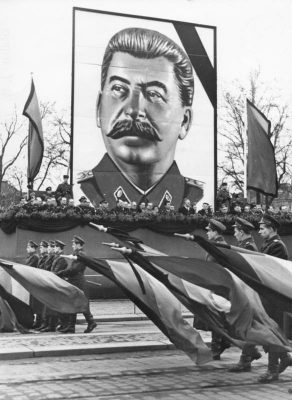Joseph Stalin died on March 5, 1953, at 74. The cause of his death was a massive hemorrhagic stroke in his left cerebral hemisphere. Stalin was the leader of the Soviet Union from 1929 to 1953, but his health worsened as World War II neared its end. The dictator was a heavy smoker and developed atherosclerosis, or the buildup of plaque in the arteries. He had already suffered a serious heart attack in October 1945.
On the evening of February 28, 1953, at the Soviet leader’s private house in Kunstsevo, Stalin invited his high-ranking officials, made up of Nikita Khrushchev, Vyacheslav Molotov, Georgy Malenkov, and Lavrentiy Beria. On that night, the men drank heavily while they watched movies. At four in the morning, the guests left, and Stalin went into his room. The Soviet dictator instructed his guards and maids that nobody was to disturb him the following morning until he was heard moving around in his room. The following day passed without Stalin leaving his room. At eleven in the evening, his maid fearfully went into his room to check on him. She found Stalin unconscious, lying on the floor in a pool of urine. She tried to wake him up, but he stayed seemingly asleep. Other servants soon rushed into the room and moved Stalin to a sofa.
Nobody called a doctor, but at 1:00 am on March 2, they informed Stalin’s four high-ranking officials about what happened. Khrushchev headed to the Soviet leader’s private residence but decided not to look at him, perhaps out of fear, saying it was inappropriate that they see Stalin in his pajamas. Some accounts narrate that Beria looked at Stalin, then told the people who were present to stop panicking because Stalin was simply sleeping. Beria, Molotov, Malenkov, and Khrushchev eventually left but returned just a few hours later as Stalin remained unconscious. At 7:00 am, they called for doctors. Doctors arrived, but they were not familiar with Stalin’s health conditions. In the past, the dictator had ordered the arrest of many of his doctors on suspicions that they were plotting to assassinate Communist officials. And so, no doctor had been able to monitor Stalin’s health and be familiar with his illnesses. The doctors were almost too scared to examine Stalin. Their hands shook, and one doctor even dropped Stalin’s dentures when he removed them. The doctors later found out that the Soviet leader had a blood pressure of 190/110. Knowing that Stalin had been suffering from hypertension, they determined that he had suffered a severe hemorrhagic stroke in the left hemisphere of his brain. Stalin’s blood pressure shot up to 210/120 over the next two days, and doctors tried different treatments to ease this pressure. They placed leeches on his neck and face in an attempt to lower the pressure, but this did not help.
Stalin’s situation worsened even more, and he eventually died at 9:50 pm on March 5, 1953. Her daughter, Svetlana Alliluyeva, narrated that, seconds before her father’s death, he opened his eyes, and his face was either terribly angry or terribly scared of death, and then he died.
Shortly after, Stalin’s body was brought to a secret place for autopsy and embalming. The death of the leader of the U.S.S.R. was announced over the radio, wherein the public was requested to stay away from general disorder. On March 9, Stalin’s body was brought to Red Square before its planned burial in Lenin’s Mausoleum. When Stalin’s coffin was paraded through Red Square, thousands of people stampeded to get one final look at their leader, resulting in thousands of people being injured and crushed to death.
After Molotov, Beria, Khrushchev, and Malenkov finished their funeral speeches, Stalin’s body was brought inside the mausoleum. At about the same time, sirens sounded throughout Kremlin, accompanied by a 21-gun salute. Gestures of respect were also carried out in North Korea, China, Mongolia, and nations that were members of the Warsaw Pact.
Theories went around that Beria poisoned Stalin. This theory cannot be ruled out because Beria, the chief of the KGB, was on Stalin’s hit list. This theory holds that Beria used either a snake or spider toxin to kill Stalin. One account from Foreign Affairs Minister Vyacheslav Molotov seems to add truth to this theory. Molotov claimed that after the dictator died, Beria boastfully said to another advisor that he was the one who saved all high-ranking officials from Stalin. Years later, Khrushchev claimed that he recalled Beria telling another official that he saved everyone from being executed by Stalin. However, some scholars dismiss these theories as nothing but propaganda against Beria.
